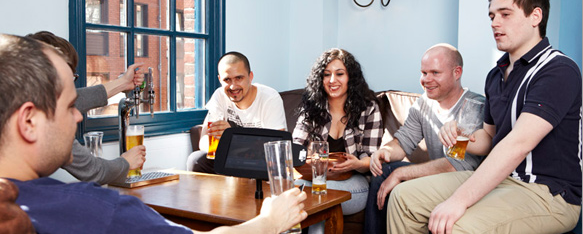When people talk about the quality of a restaurant or a bar, the main criteria for their judgement is the quality of product (like drinks or food) and the quality of service. The venue could be amazing, but if the meal is terrible or more importantly, if the staff are useless, we’re unlikely to go back.
Service in hospitality is about making the customer’s experience easy and enjoyable. In restaurants, this means you need talented and knowledgeable waiters who can explain menus and cater for various diets. In bars you need savvy bartenders who explain the drinks menu and can provide interesting conversation.
But where does service fit in to pubs? In a pub there isn’t a complex menu to explain, the drinks are simple and well known and usually the customer knows what he or she will be ordering. In fact, unlike bars or restaraunts, the singular, most important aspect of service in a pub is speed. Pubs are usually have one staff for every 20 or more patrons, so this rapid rate of service is essential for a pleasant experience and a smooth operation.
This is where the minimal service approach comes in. Last week, I heard a great story about the Thirsty Bear pub in London, which recently introduced self-service beer taps along with tablets for automatic food orders. The pub was outfitted with iPads at 15 tables with 12 of them linked to self-serve taps. Not only can customers now pour their own pints and order food using the tablets by setting up an electronic tab at the bar. They can also send text messages for waiter service, order songs from a connected Jukebox, and even update their Facebook profiles. A dedicated advertising channel on the tablets lets the pub promote its latest special offers.
This ‘no-service’ approach increases speed and efficiency which maximises the experience for the customer. In the same way that petrol stations eventually realised that people prefer to pump their own gas, The Thirsty Bear came to the understanding that customers prefer to pour their own beer. The pub has enjoyed a 78% increase in revenue since introducing the self-service approach so the efficiency element is still strongly in play.
The biggest learning from this is that businesses must adapt their services for their clients on an individual basis. While in one situation an intensive approach to service is necessary for a great customer experience, for another, the less involvement the better the overall experience. Work out what your customers value most when being serviced and adapt accordingly. Just as every small business doesn’t need a Twitter account, but may need a Facebook page or a Google listing, make sure your improvements are based on what your customers need, rather than what you imagine they might want.
http://smarter.telstrabusiness.com/experts/why-no-service-is-sometimes-the-best-service-of-all.htm













